|
|
|

1996 Interview |
Discography
A reluctant star on the rise
Anyone who's heard Sony/Columbia
recording artist Maxwell's debut CD, "Maxwell's Urban Hang Suite",
would agree that it's everything but an ordinary contemporary r & b album. Unlike much
of today's sometimes insipid commercial Soul (which relies heavily on samples for the
groove and over-explicit promises of sex for lyrics) Maxwell's creation is arguably
different but nevertheless sensuous and funky. Built around his own true-life love story,
"Maxwell's Urban Hang Suite" is an album with a concept. Backed with
live instrumentation and a sound which is hard to define, but easy to love, Maxwell's the
merger, the link between the sounds of the nineties and the finest of the '70's and early
'80's. As fresh as it is fadeless.
The album's eleven songs reveal true
appreciation and understanding of that era and it's obvious that what we have here is a
bona fide artist at work. It wouldn't surprise me one bit if in a few years time, Maxwell
will be one of the most celebrated stars on the Soul scene. That is, if he wants to and
I'm not so sure he does. As I found out (during a forty-minute phone interview with the
man himself , two months before the record was released) words like ordinary and
predictable are just as ill-fitting when it comes to describing Maxwell's personality as
his music. Introvert, bohemian and shy are just a few of the things that have been said
about him in the press. Sure, Maxwell's not the type of guy to flaunt or brag, (in fact,
not even his mother knew about his record deal for a long time), but my female intuition
was right when it told me that any man daring to share his innermost feelings, desires and
pains with the listeners, simply couldn't be afraid to interpret the message and the
music, especially not with a freelance R & B journalist from Sweden. Friendly, humble
and very fascinating is how I perceived him. So what if he didn't answer the first
question completely truthfully.
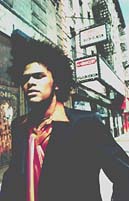 -I would prefer
not to tell you my full name. I have many, many names.. Since I'm half Puerto Rican, half
West Indian, everyone wants to name you, so Maxwell's like the best way to consolidate.
For me to tell you my full name would take such a long time. Honestly, that's what it is,
Maxwell vowed with a laughter, at first half-heartedly attempting to convince me (by
picking up on my joke about his driver's license carrying tons of initials) then
stating -I would prefer
not to tell you my full name. I have many, many names.. Since I'm half Puerto Rican, half
West Indian, everyone wants to name you, so Maxwell's like the best way to consolidate.
For me to tell you my full name would take such a long time. Honestly, that's what it is,
Maxwell vowed with a laughter, at first half-heartedly attempting to convince me (by
picking up on my joke about his driver's license carrying tons of initials) then
stating
-I'm sure someone will dove into some archive one day and find out what they need to find
out.
Maxwell was born and raised in
East New York, Brooklyn, a place described as one of the roughest neighborhoods in that
area. Even though he's moved and now lives in downtown Manhattan, he speaks fondly of his
old home territories and doesn't like the way they are portrayed in the media.
-Well, South Bronx, Harlem and Brooklyn are nice places to me, I guess it's all in where
you're coming from and how you think about it. I learned and gained a lot from growing up
and living in those areas. There's so much joy and love and compassion there. It's not all
they say it is. I know there are some things that go on there every day that are
unfortunate, as far as violent kinds of things. I believe your surroundings are not you ,
it's how you think that makes you the person you are. I loved living up there and I would
never have changed it. I didn't run out and tried to get into some big, plush place. I
moved out and went to a more eclectic version, but it's definitely just about the same
thing. I get so much inspiration from the city and all the different kinds of people
struggling and trying to survive.
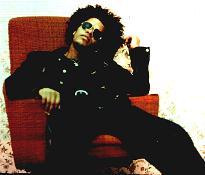 Maxwell's the
first to say he's nowhere near the stereotype one might expect coming from that
background. He claims to never have had a drink or a puff and depreciates the so called
ghetto macho's oversized ego as much as their compulsory degrading view on women. Maxwell's the
first to say he's nowhere near the stereotype one might expect coming from that
background. He claims to never have had a drink or a puff and depreciates the so called
ghetto macho's oversized ego as much as their compulsory degrading view on women.
-I really honor women for what they are and for what they represent as people. I honestly
believe that they teach (men) a lot just by their ways of living, as far as the emotional
sense that they have. And their lack of ego is so intriguing to me! I'm amazed at how a
woman can have a child and just know what to do. It's just so instinctive to them. I
strive for that..To have as little ego as possible.
Buying his first keyboard at sixteen or
seventeen ("an old wack thing"), he became obsessed with music and began working
with a basic four track studio set up. To support himself he waitered tables at a
restaurant but never actively pursued a career in the music business. As it turned out, a
friend who knew a friend at a record company, eventually had Maxwell recording demos in a
24 track studio and soon thereafter, several labels showed interest.
-I chose Sony because, unlike some of the other record companies, they didn't ask me to
conform or tried to change me which I wasn' t willing to do, he explained
-When I first started working with Sony, they were obviously a bit nervous about me going
in and producing myself, so they went and got a guy from Chicago called P.M.
who was engineering, mixing and programming that could help me out. But no one from the
label checked on me. Other people involved were Stuart Matthewman who's
worked with Sade, he's in my live band as well and Bashiri Johnson played
percussion. 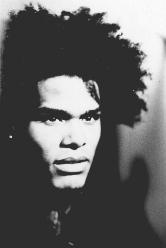 On the album, I programmed, played synthesizer,
piano, moog and guitars and then I used different people on different tracks, whoever I'd
get a feel for might suit the track. It wasn't about me being the almighty. I just wanted
to have good sounding music. I'm not Beethoven or anything, I just do what I can do to get
the music out of me. There are a lot of people on this record. It was like they gravitated
towards it and it was great because usually I end up doing it all myself. I was in a
situation once where no one was around, musicians would be late, so I ended up putting the
tracks together myself. But it was such an honor to have these people wanna be a part of
this story, that I couldn't be selfish with it. Not with this album. Maybe in the future I
might go into my little cave and do the whole thing, but all of this was just such a
blessing, all these things were sent down from heaven. Everyone has their own heartbroken
story to tell and it was nice to have to have all these people put their emotions and
experiences inside this little story that I felt that I was all alone with. Some people
just came in and played, they had no idea what I was trying to do.. So, I can't say
everyone knew, but with those who did, it was nice. On the album, I programmed, played synthesizer,
piano, moog and guitars and then I used different people on different tracks, whoever I'd
get a feel for might suit the track. It wasn't about me being the almighty. I just wanted
to have good sounding music. I'm not Beethoven or anything, I just do what I can do to get
the music out of me. There are a lot of people on this record. It was like they gravitated
towards it and it was great because usually I end up doing it all myself. I was in a
situation once where no one was around, musicians would be late, so I ended up putting the
tracks together myself. But it was such an honor to have these people wanna be a part of
this story, that I couldn't be selfish with it. Not with this album. Maybe in the future I
might go into my little cave and do the whole thing, but all of this was just such a
blessing, all these things were sent down from heaven. Everyone has their own heartbroken
story to tell and it was nice to have to have all these people put their emotions and
experiences inside this little story that I felt that I was all alone with. Some people
just came in and played, they had no idea what I was trying to do.. So, I can't say
everyone knew, but with those who did, it was nice.
 So how
did legendary producer, songwriter, arranger and singer Leon Ware,
co-responsible for one of the best concept-albums of all times; Marvin Gaye's "I
Want You", become part of the project and what was it like working with him? So how
did legendary producer, songwriter, arranger and singer Leon Ware,
co-responsible for one of the best concept-albums of all times; Marvin Gaye's "I
Want You", become part of the project and what was it like working with him?
-I think he had heard of me or seen me perform. He was in town and we ended up having
dinner. We hit it off and wrote "Sumthin Sumthin" together. It
was interesting working with him and it was an amazing honor, of course. It's funny, the
song ended up changing. It was something else when we wrote it and later on when Leon was
back in town, he came to the studio while I was working on the new version, lyrics and all
that. He said "man, you've changed the whole song up!" He wasn't bothered or
anything, but he was kinda taken aback that it could evolve into something else that way.
He was pleased, I'm happy he was.
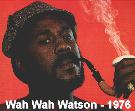 Those
who study the musicians credits will find Wah Wah Watson (a.k.a. Melvin
Ragin) on guitar and as co-composer of "The Urban Theme" and "The
Suite Theme". Two exquisite atmospheric instrumentals, one opens, the other
closes the album. Not having seen his name on anything recently, Wah Wah's return was a
happy surprise to me. Wah Wah was The top session guitarist during the '70's and '80' and
his name appears on numerous records . He's also equipped with one of the most distinctive
styles in the business. Those
who study the musicians credits will find Wah Wah Watson (a.k.a. Melvin
Ragin) on guitar and as co-composer of "The Urban Theme" and "The
Suite Theme". Two exquisite atmospheric instrumentals, one opens, the other
closes the album. Not having seen his name on anything recently, Wah Wah's return was a
happy surprise to me. Wah Wah was The top session guitarist during the '70's and '80' and
his name appears on numerous records . He's also equipped with one of the most distinctive
styles in the business.
-Wah Wah and I are very, very good friends now. He calls me his little brother!, Maxwell
said, without any false attempts to hide how proud that made him feel.
-We've been on tour together and he's helped me out, he really has my back. We just got
together through a writing situation that came up from another label a long time ago. We
walked away from it, really getting along and really getting a sense of where we were
coming from. He was just always there to the very end, so I would fly him out to New York
and he played on some of the tracks. I'm such a big fan of what he did with Barry White
and all that Motown stuff.
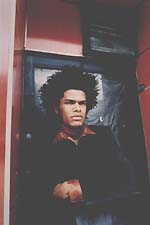 Maxwell seemed
as astounded as I about the collaboration. Maxwell seemed
as astounded as I about the collaboration.
-Yeah, how often do you get a chance to work with one of your heroes? When the opportunity
to work with Watson came up, I was completely nerve-wrecked! I couldn't believe this was
happening to me. Even now when I look at the things that have come from just putting these
songs together, I can't even believe it. He taught me so much about being a musician and
about structure, just a lot of the subtle little things that you kinda lose out from
hearing what's around today. He made me feel cool about where I was coming from, because I
was a little out.
Asking Maxwell to explain what he meant
by out he unveiled the circumstances under which the album had been done.
-This record was finished a year ago and in the process of making it, I don't quite think
everyone understood what I was trying to accomplish. I was getting tons of support from
the one person I was working with at Sony but.. It was the kind of thing that you had to
hear it after the story was finished. When we were in the stages of three or four songs, I
don't think anyone knew what it was about.
Judging by the warm, vibrant feel of
his album, it sounds as if the early '80's post-disco blend of Soul and Funk was his major
influence for the album. (Just listen to the slap bass groove in "Sumthin
Sumthin", if you need convincing). In the biography sent out by Sony to the
press, Maxwell is quoted stating "the early '80's had the perfect combination of
computerized instrumentation with a live feel. Later the music got all into hip-hop and
some of the dynamics were lost". He confirmed:
-Yes, that was my inspiration for the album. That's my old school. I was born in 1973 and
my understanding of music happened maybe six years after my birth, so in the '80's that's
when I knew music. I didn't know I was gonna be a musician , but that's my time, the time
of S.O.S Band and Loose Ends. That vibe was where I was and what I was living. When going
through puberty, falling in love and getting crushes and stuff, it was on that music. That
is why I identify with it the most. I also like to listen to a lot of classical music. I
really get into symphonies that have themes and reason. Where you can find more meaning as
you listen to it.
 The hype
surrounding "Maxwell's Urban Hang Suite" has been massive and
now that the record's out, many well-deserved words of praise have been written about it.
So what's Maxwell's biggest fear? The hype
surrounding "Maxwell's Urban Hang Suite" has been massive and
now that the record's out, many well-deserved words of praise have been written about it.
So what's Maxwell's biggest fear?
-Success. I must say it is a big fear of mine. I've always told my friends and it freaks
them out when I say that success is the biggest fear that I have, in reference to my
career, whatever's gonna happen in the future. The thing that kills me is honestly that I
believe success is something you have to maintain. It requires so much maintenance to
remain where you're at, on that level, and to try and keep the level of work that you like
to do. Failure's not really the hardest thing to do, it's very easy to fail. It's very
easy to just not try and go for it and that kind of thing. My whole take on that is that
the best thing you can do as an artist is try to be and express yourself. If you get
caught up in your hits and what's happening on the radio you will fall prey to that and I
don't need that kind of monkey on my back. If you can strive to create your own niche and
your own world and your own genre, then at the end of the day whatever happens is good,
because you would have done what you wanted to do and you would have expressed your
spiritual soul. No one can knock you for that, even if only one person bought it.
The bashful Maxwell is very well aware
of how the media can build an artist to destroy and admitted not feeling comfortable in
dealing with the press. With a critically acclaimed debut such as "Maxwell's
Urban Hang Suite", my next question was if it wouldn't be tremendously
pressuring to work under the high expectations that inevitably will precede the follow-up?
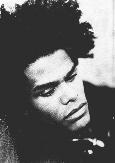 -No, because I've already recorded it. When the record was
finished in March last year (1995), I had to do something. I'm not one for twiddling my
thumbs. Over the summer I worked on the next thing. They're not fully recorded tracks, but
they're fully demo'ed versions of themselves, so that when the recording situation brings
itself to me, I'll be able to have a fresh outlook as well. -No, because I've already recorded it. When the record was
finished in March last year (1995), I had to do something. I'm not one for twiddling my
thumbs. Over the summer I worked on the next thing. They're not fully recorded tracks, but
they're fully demo'ed versions of themselves, so that when the recording situation brings
itself to me, I'll be able to have a fresh outlook as well.
Pointing out the comparisons that will
be made between Maxwell and D'Angelo (both are young
multi-instrumentalists who have gone against the grain) Maxwell's response "They
will?" perhaps suggests that he hadn't even thought of himself playing in the same
league as D'Angelo. It's certainly not a sign of low self-esteem, but of his lack of an
ego, plus displeasure with the competitive side of the business. Maxwell continued in his
smooth, cool tone of voice
-Why would I feel any other way than complimented by being compared to D'Angelo? To me,
that's a complete honor. He's great! I just wanna make it clear that I don't look at the
music business like the Olympics. I know that the industry can do that sometimes and it's
unfortunate because it puts us artists in a hard position. I respect everyone that's
expressing themselves a hundred percent, based upon their own experiences. They should get
applauded for it because not many artists are doing that. My whole take on everyone else
is even if it's something that I'm not personally down with, I always respect their
expression. At least as long as it's not about the dollar.
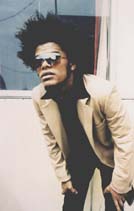 Finally turning
the attention over to the thread that runs all through "Maxwell's Urban
Hang Suite" I wondered just what the title meant and if he saw it as a
celebration to love in a universal sense or to the love of the woman of his fantasies, the
lady he met in the flesh for one day, who not only broke his heart but gave him the
concept for the album. He paused for a while, took a deep breath and said Finally turning
the attention over to the thread that runs all through "Maxwell's Urban
Hang Suite" I wondered just what the title meant and if he saw it as a
celebration to love in a universal sense or to the love of the woman of his fantasies, the
lady he met in the flesh for one day, who not only broke his heart but gave him the
concept for the album. He paused for a while, took a deep breath and said
-Uhh, there are three or four meanings to the title for me. I guess what it would
mean..It's kinda hard to say. It's kinda like the merger between the sophisticated and the
urban, like a combination..You know? Layin' back with whatever this collection of
music is I would think.. Maybe.. slightly, sorta, kinda.. (laughs). What does it mean to
you from hearing the record?
Turning back the questions to me was a re-occurring theme while talking to Maxwell. He
explained his curiosity:
-I mean this from the bottom of my heart.. I'm so interested in how people are affected by
it, be it good or bad. I get so much from hearing what you might feel. What I get from it,
is what I get from it. I never like to dictate any particular way of looking at the
record, because so many people view it differently. I don't like to impose my view. I feel
that the only imposition I need to make, is to make the music.
Would it be fair to say that the whole
album evolves around the short encounter you had with what we all secretly dream of; the
divine combination of spiritual and sexual love, the union of mind body and soul?, I
asked. It almost seemed as if Maxwell mused aloud as he talked, exposing his spiritual
side.
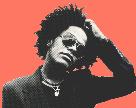 -To me a lot of this record is not about the physical, earthly
situation that it was but in many ways it's about a spiritual thing for me. As well as she
is a physical being , I can see it on the other side, which is my pursuit for something
higher, my relationship with the higher forces. This album represents that as well for me.
As time went on, it became more so. It was weird how I almost felt tricked, I felt like
God gave me this situation. And then three or four or five months later, I could see that
he or she was trying to explain what our relationship is. I mean spiritually, of course.
This path was chosen for me, I didn't choose this. -To me a lot of this record is not about the physical, earthly
situation that it was but in many ways it's about a spiritual thing for me. As well as she
is a physical being , I can see it on the other side, which is my pursuit for something
higher, my relationship with the higher forces. This album represents that as well for me.
As time went on, it became more so. It was weird how I almost felt tricked, I felt like
God gave me this situation. And then three or four or five months later, I could see that
he or she was trying to explain what our relationship is. I mean spiritually, of course.
This path was chosen for me, I didn't choose this.
So how does he look at this
bitter-sweet love affair today?
-My philosophy is that all things happen for the ultimate good of you. What you make of
the situation is what the situation is, ultimately. That's what I did with my heartbreak.
Hopefully some people will be able to identify, because I honestly feel that I'm not the
only one in search of the this person or thing that is gonna complete you.
Maxwell corrected himself by adding -Not complete you, but just make you feel whole.
|

 -I would prefer
not to tell you my full name. I have many, many names.. Since I'm half Puerto Rican, half
West Indian, everyone wants to name you, so Maxwell's like the best way to consolidate.
For me to tell you my full name would take such a long time. Honestly, that's what it is,
Maxwell vowed with a laughter, at first half-heartedly attempting to convince me (by
picking up on my joke about his driver's license carrying tons of initials) then
stating
-I would prefer
not to tell you my full name. I have many, many names.. Since I'm half Puerto Rican, half
West Indian, everyone wants to name you, so Maxwell's like the best way to consolidate.
For me to tell you my full name would take such a long time. Honestly, that's what it is,
Maxwell vowed with a laughter, at first half-heartedly attempting to convince me (by
picking up on my joke about his driver's license carrying tons of initials) then
stating  Maxwell's the
first to say he's nowhere near the stereotype one might expect coming from that
background. He claims to never have had a drink or a puff and depreciates the so called
ghetto macho's oversized ego as much as their compulsory degrading view on women.
Maxwell's the
first to say he's nowhere near the stereotype one might expect coming from that
background. He claims to never have had a drink or a puff and depreciates the so called
ghetto macho's oversized ego as much as their compulsory degrading view on women. On the album, I programmed, played synthesizer,
piano, moog and guitars and then I used different people on different tracks, whoever I'd
get a feel for might suit the track. It wasn't about me being the almighty. I just wanted
to have good sounding music. I'm not Beethoven or anything, I just do what I can do to get
the music out of me. There are a lot of people on this record. It was like they gravitated
towards it and it was great because usually I end up doing it all myself. I was in a
situation once where no one was around, musicians would be late, so I ended up putting the
tracks together myself. But it was such an honor to have these people wanna be a part of
this story, that I couldn't be selfish with it. Not with this album. Maybe in the future I
might go into my little cave and do the whole thing, but all of this was just such a
blessing, all these things were sent down from heaven. Everyone has their own heartbroken
story to tell and it was nice to have to have all these people put their emotions and
experiences inside this little story that I felt that I was all alone with. Some people
just came in and played, they had no idea what I was trying to do.. So, I can't say
everyone knew, but with those who did, it was nice.
On the album, I programmed, played synthesizer,
piano, moog and guitars and then I used different people on different tracks, whoever I'd
get a feel for might suit the track. It wasn't about me being the almighty. I just wanted
to have good sounding music. I'm not Beethoven or anything, I just do what I can do to get
the music out of me. There are a lot of people on this record. It was like they gravitated
towards it and it was great because usually I end up doing it all myself. I was in a
situation once where no one was around, musicians would be late, so I ended up putting the
tracks together myself. But it was such an honor to have these people wanna be a part of
this story, that I couldn't be selfish with it. Not with this album. Maybe in the future I
might go into my little cave and do the whole thing, but all of this was just such a
blessing, all these things were sent down from heaven. Everyone has their own heartbroken
story to tell and it was nice to have to have all these people put their emotions and
experiences inside this little story that I felt that I was all alone with. Some people
just came in and played, they had no idea what I was trying to do.. So, I can't say
everyone knew, but with those who did, it was nice. So how
did legendary producer, songwriter, arranger and singer Leon Ware,
co-responsible for one of the best concept-albums of all times; Marvin Gaye's "I
Want You", become part of the project and what was it like working with him?
So how
did legendary producer, songwriter, arranger and singer Leon Ware,
co-responsible for one of the best concept-albums of all times; Marvin Gaye's "I
Want You", become part of the project and what was it like working with him? Those
who study the musicians credits will find Wah Wah Watson (a.k.a. Melvin
Ragin) on guitar and as co-composer of "The Urban Theme" and "The
Suite Theme". Two exquisite atmospheric instrumentals, one opens, the other
closes the album. Not having seen his name on anything recently, Wah Wah's return was a
happy surprise to me. Wah Wah was The top session guitarist during the '70's and '80' and
his name appears on numerous records . He's also equipped with one of the most distinctive
styles in the business.
Those
who study the musicians credits will find Wah Wah Watson (a.k.a. Melvin
Ragin) on guitar and as co-composer of "The Urban Theme" and "The
Suite Theme". Two exquisite atmospheric instrumentals, one opens, the other
closes the album. Not having seen his name on anything recently, Wah Wah's return was a
happy surprise to me. Wah Wah was The top session guitarist during the '70's and '80' and
his name appears on numerous records . He's also equipped with one of the most distinctive
styles in the business. Maxwell seemed
as astounded as I about the collaboration.
Maxwell seemed
as astounded as I about the collaboration. The hype
surrounding "Maxwell's Urban Hang Suite" has been massive and
now that the record's out, many well-deserved words of praise have been written about it.
So what's Maxwell's biggest fear?
The hype
surrounding "Maxwell's Urban Hang Suite" has been massive and
now that the record's out, many well-deserved words of praise have been written about it.
So what's Maxwell's biggest fear? -No, because I've already recorded it. When the record was
finished in March last year (1995), I had to do something. I'm not one for twiddling my
thumbs. Over the summer I worked on the next thing. They're not fully recorded tracks, but
they're fully demo'ed versions of themselves, so that when the recording situation brings
itself to me, I'll be able to have a fresh outlook as well.
-No, because I've already recorded it. When the record was
finished in March last year (1995), I had to do something. I'm not one for twiddling my
thumbs. Over the summer I worked on the next thing. They're not fully recorded tracks, but
they're fully demo'ed versions of themselves, so that when the recording situation brings
itself to me, I'll be able to have a fresh outlook as well. Finally turning
the attention over to the thread that runs all through "Maxwell's Urban
Hang Suite" I wondered just what the title meant and if he saw it as a
celebration to love in a universal sense or to the love of the woman of his fantasies, the
lady he met in the flesh for one day, who not only broke his heart but gave him the
concept for the album. He paused for a while, took a deep breath and said
Finally turning
the attention over to the thread that runs all through "Maxwell's Urban
Hang Suite" I wondered just what the title meant and if he saw it as a
celebration to love in a universal sense or to the love of the woman of his fantasies, the
lady he met in the flesh for one day, who not only broke his heart but gave him the
concept for the album. He paused for a while, took a deep breath and said  -To me a lot of this record is not about the physical, earthly
situation that it was but in many ways it's about a spiritual thing for me. As well as she
is a physical being , I can see it on the other side, which is my pursuit for something
higher, my relationship with the higher forces. This album represents that as well for me.
As time went on, it became more so. It was weird how I almost felt tricked, I felt like
God gave me this situation. And then three or four or five months later, I could see that
he or she was trying to explain what our relationship is. I mean spiritually, of course.
This path was chosen for me, I didn't choose this.
-To me a lot of this record is not about the physical, earthly
situation that it was but in many ways it's about a spiritual thing for me. As well as she
is a physical being , I can see it on the other side, which is my pursuit for something
higher, my relationship with the higher forces. This album represents that as well for me.
As time went on, it became more so. It was weird how I almost felt tricked, I felt like
God gave me this situation. And then three or four or five months later, I could see that
he or she was trying to explain what our relationship is. I mean spiritually, of course.
This path was chosen for me, I didn't choose this.